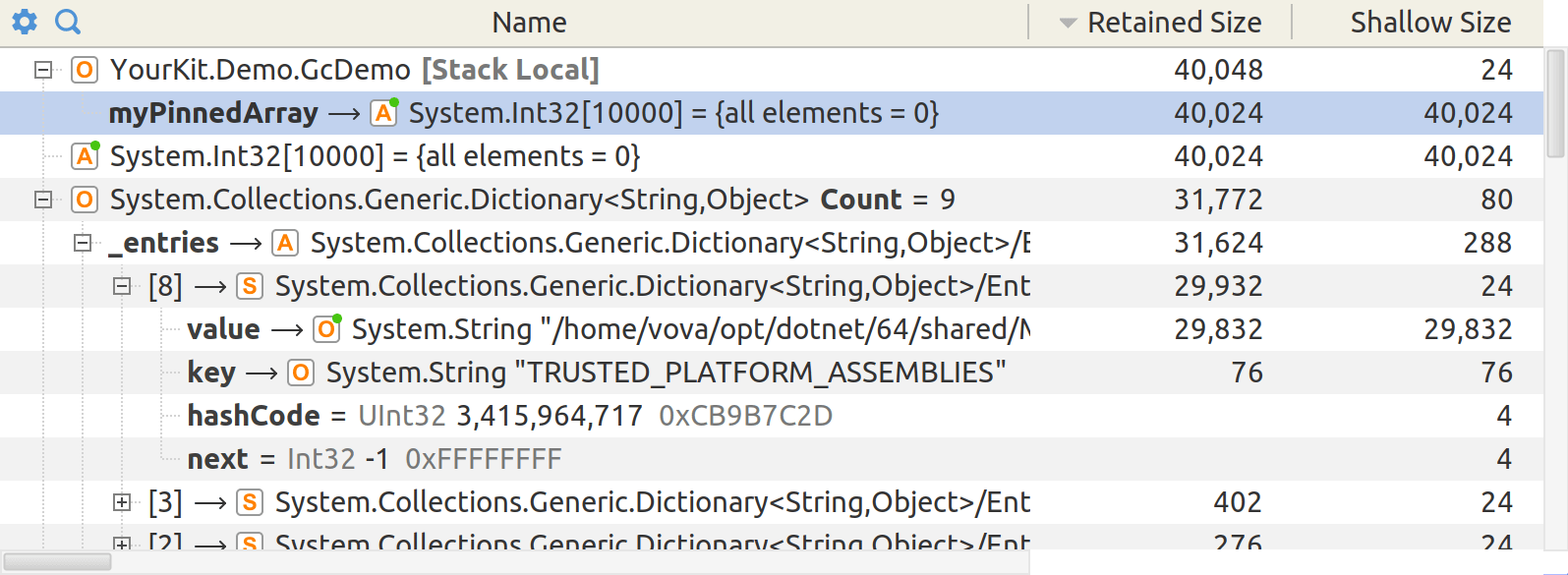- System requirements
- Profiler architecture
- Profiler installation
- Uninstall profiler
- Running the profiler
- Profiler activation
- Welcome screen
- Start profiling
- Profiling overhead
- Snapshots
- Solving performance problems
- CPU profiling
- Thread profiling
- Object allocation profiling
- Memory profiling
- Exception profiling
- Telemetry
- Probes: monitor higher level events
- Inspections: automatic recognition of typical problems
- Automatically trigger actions on event
- Automatic deobfuscation
- Summary, automatic deobfuscation
- Filters
- Profiler command line
- Command line tool to control profiling
- Export of profiling results to external formats
- Profiler .NET API
- Profiler HTTP API
- Settings
- Troubleshooting
Object explorer
This simple view allows to traverse outgoing and incoming object references. This is not useful for memory leak detection, but this is powerful tool to examine values of object's fields, as you do in a debugger. To find memory leaks, use paths to GC roots.
Outgoing references
Shows all objects of the set and allows you to browse their outgoing references. Outgoing references of an object are fields or array elements of that object that point to other objects.

Incoming references
Shows all objects of the set and allows you to browse their incoming references. Incoming references of an object are references to that object.
Do not use Incoming references to find out why an object is retained in memory. Use paths, which is specially designed for this purpose.

Class-specific object presentation
In Object explorer values are immediately shown for object instances of common classes, so the most useful information is inlined, saving time expanding and searching for the specific field. Profiler has special presentation for the following classes:
System.BooleanSystem.ByteSystem.CharSystem.Collections.ArrayList/ReadOnlyArrayListSystem.Collections.ArrayList/SyncArrayListSystem.Collections.ArrayListSystem.Collections.BitArraySystem.Collections.Concurrent.BlockingCollectionSystem.Collections.Concurrent.ConcurrentBagSystem.Collections.Concurrent.ConcurrentDictionary/NodeSystem.Collections.Concurrent.ConcurrentDictionarySystem.Collections.Concurrent.ConcurrentQueueSystem.Collections.Concurrent.ConcurrentStackSystem.Collections.Generic.HashSetSystem.Collections.Generic.KeyValuePairSystem.Collections.Generic.LinkedListSystem.Collections.Generic.ListSystem.Collections.Generic.PriorityQueueSystem.Collections.Generic.QueueSystem.Collections.Generic.SortedDictionarySystem.Collections.Generic.SortedListSystem.Collections.Generic.SortedSetSystem.Collections.Generic.StackSystem.Collections.Generic.TreeSetSystem.Collections.Hashtable/SyncHashtableSystem.Collections.Hashtable/bucketSystem.Collections.HashtableSystem.Collections.Immutable.ImmutableArraySystem.Collections.ObjectModel.ReadOnlyCollectionSystem.Collections.Queue/SynchronizedQueueSystem.Collections.QueueSystem.Collections.SortedList/SyncSortedListSystem.Collections.SortedListSystem.Collections.Stack/SyncStackSystem.Collections.StackSystem.DateTimeSystem.DecimalSystem.DoubleSystem.Drawing.ColorSystem.EnumSystem.GuidSystem.HalfSystem.IO.FileStreamSystem.Int16System.Int32System.Int64System.SByteSystem.SingleSystem.Threading.ThreadSystem.UInt16System.UInt32System.UInt64System.UriSystem.ValueType
